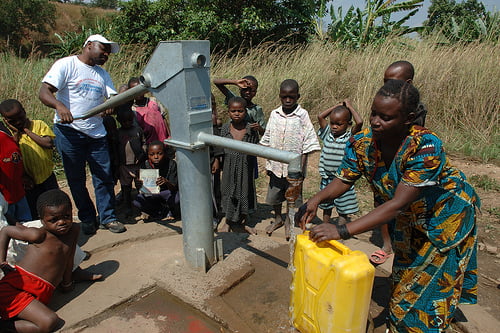

Environment
Managing water for sustainable prosperity: “radical transformations” needed
With the idea of resource scarcity threatening our not-so-distant future, the world’s poorest nations are irrefutably at risk, and less equipped to cope with the changes on the horizon.
It is becoming a moral imperative that developed nations act upon proposals of sustainable resource management – not only for the sake of the environment but also in proving the possibility of a thriving and effective global community.
This week marks the fourth Africa Water Week. Organised by the African Ministers Council on Water (AMCOW), the week symbolises a political commitment to seeking solutions to Africa’s water and sanitation challenges.
Representatives from Water Aid attending the event in Cairo are supporting the proposal that will lead to 42.8m Africans benefitting from safe drinking water and 59.9m from adequate sanitation over the next two years.
Nelson Gomonda, Pan-African programme manager leading the Water Aid delegation said, “African governments run the risk of a serious credibility gap if they do not seize the opportunity to tackle this crisis by significantly increasing access to water and sanitation in their countries.
“With thousands of African children dying every day, governments should honour previous promises to increase their spending on sanitation.”
We need to change the way we think about water, this much is true. Strengthening the message of Africa’s current water appeal, the European Report on Development, published on Wednesday, stands as a timely appeal for governments and the international community to “radically transform” approaches to water, energy and land (WEL) resourcing, and draws attention to the needs of the world’s poorest developing countries.
The flagship report, Confronting scarcity: managing water, energy and land for inclusive and sustainable growth, aims to demonstrate the urgency of the transformative pillars being addressed in the approaching Rio+20 summit, and demands that the EU recognises the need to achieve universal access to clean water, energy and sustainable food security.
It is predicted that close to one billion people are undernourished and 0.9 billion lack access to safe water and have no source of electricity.
In addition, the demand for energy and water is expected to grow by 40% – and for food by 50% – by 2030 compared to present levels. Armed with this information, the report’s focus on water, energy and land is hoped to accentuate the communities that are under growing strain from rising food prices, climate change, global population growth and economic expansion.
“The report analyses the interconnections among water, energy and land and stresses the benefits of shifting towards an integrated nexus approach”, said Adris Piebalgs, European commissioner for development, in the report.
“This independent research by three leading EU development institutes (The Overseas Development Institute (ODI), The Deutsches Institut fuer Entwicklungsspolitik (DIE) and The European Centre for Development Policy Management (ECDPM)) calls on us to manage water , energy and land better.
“It encourages us to think and acts more strategically, working in cooperation with partner countries and the private sector to increase the impact of our policies and foster inclusive and sustainable growth.”
Both Africa Water Week and the European Report on Development aim to appeal to the globe’s most notably developed countries.
So, however concerned we are for our economy today, as ever, the footprint of tomorrow remains in the hands of our governments.
Worldwide sustainability and security is under enormous pressure and the daunting question remains; are we doing enough? You can ensure that you are by investing your money in places that don’t have a negative effect on the planet.
Read our Guide to Sustainable Investment for an insight into an ever-growing form of investment, and fill in our online form if you wish to go further.
Further reading:
Investment in water is a “first necessity”


 Environment12 months ago
Environment12 months agoAre Polymer Banknotes: an Eco-Friendly Trend or a Groundswell?

 Features11 months ago
Features11 months agoEco-Friendly Cryptocurrencies: Sustainable Investment Choices

 Features12 months ago
Features12 months agoEco-Friendly Crypto Traders Must Find the Right Exchange

 Energy11 months ago
Energy11 months agoThe Growing Role of Solar Panels in Ireland’s Energy Future





























